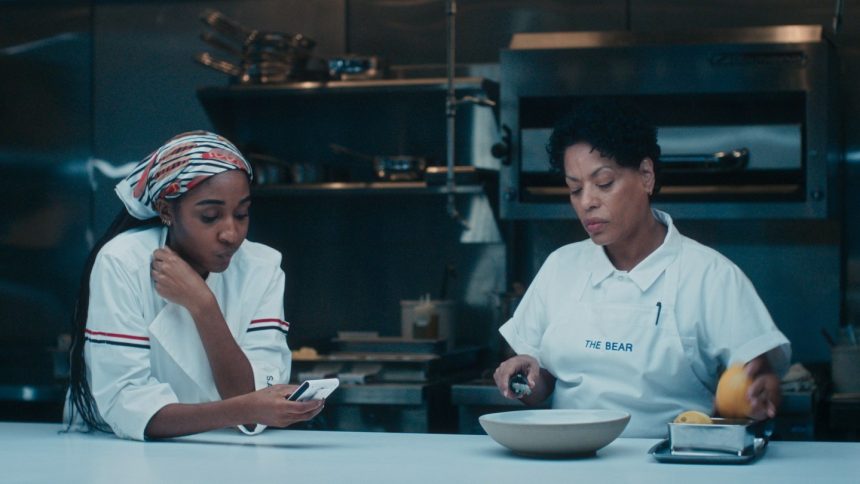‘The Bear’ Review: FX/Hulu’s Culinary Dramedy Stalls Out With a Muted Fourth Season
Time is a relentless force in FX/Hulu’s The Bear, pressing ahead no matter how strenuously our characters try to ignore it or slow it down. Morning alarms drag bleary-eyed employees out of bed. Kitchen timers measure their work to the millisecond. An “Every Second Counts” sign scans as both inspiration and warning, while nearby, a giant clock ticks down the minutes until the restaurant officially runs out of money; as of the season four premiere, it’s set at 1,440 hours, or about two months.
But even as time marches on, momentum is under no obligation to follow. Where The Bear once seemed almost too restless — exploding with stress and thriving on turmoil, eager to subvert and surprise — the latest run has the feel of a show burnt out from the effort of trying to outdo itself. Rather than push forward or drill deeper, it retreats into familiar territory as it prepares, maybe, to wind down for good.
To what extent that sense of exhaustion stems from creator Christopher Storer and his team, and to what extent it simply reflects their protagonist, Carmy (Jeremy Allen White, continually excellent), is difficult to say. Perhaps it doesn’t matter, when the series has always so closely identified itself with Carmy’s psychology, and when we as viewers are inundated by the vibe either way.
Having spent much of season three flailing to convince himself he’s not stuck in a rut, Carmy begins season four dozing off to Groundhog Day and relating way too hard to lines like, “What would you do if you were stuck in one place, and every day was exactly the same, and nothing that you did mattered?”
You Might Also Like
He’s still angry and grieving, still prone to self-sabotage and self-destruction, and increasingly desperate to break the cycles that have trapped him there. If it’s tempting to mutter, “This again?” when Carmy rehashes once more his feelings of guilt around the death of big brother Mikey (Jon Bernthal), or promises to do better-but-no-really-for-real-this-time — well, one can surely sympathize with how much more exhausted Carmy must be to find himself back in this place, and with how impossible it can seem to grow past our deepest wounds.
And one can acknowledge that to some extent, familiarity is to be expected — welcomed, even — from a beloved show in its fourth season. If last year was the equivalent of The Bear’s “chaos menu,” stuffed with flashy ingredients in experimental arrangements, this year is the more streamlined selection Carmy finally agrees to lock in — reliable favorites pared down to their most essential components. It is a comfort to be reunited with the boisterous staff we’ve logged so many thrilling hours with already, to be enveloped once more by their professional banter and unprofessional screaming matches, to fall into the rhythms of Storer and producer/music supervisor Josh Senior’s eclectically cool rock soundtrack.
We know by now to look forward to the extra-long episode with All the Guest Stars, longer and starrier than ever this round at 69 minutes including a guest appearance by Oscar winner Brie Larson. And we can eagerly anticipate the one-off detour into a non-Carmy character’s life outside the restaurant — in this case a minor gem of a half-hour following Syd (Ayo Edebiri) on her day off as she drops by her cousin Chantel’s (Danielle Deadwyler) to get her hair braided and bonds with Chantel’s tween daughter TJ (Arion King).
But as nice as it is to be back, it’s also difficult not to notice a stagnancy setting in — as if Carmy’s inability to move on means that no one else is allowed to either.
While the peek into Syd’s personal life is welcome, she spends the season dithering over the same decision presented to her last season, of whether to accept a job offer from a rival chef (Adam Shapiro). Richie (Ebon Moss-Bachrach) continues to cling to the restaurant as his purpose in life, and to grumble about his ex (Gillian Jacobs) getting remarried. Natalie (Abby Elliott) still alternates between frowning at spreadsheets and willing Carmy to give a shit about her new baby. And Tina (Liza Colón-Zayas) simply makes the same pasta dish over and over and over, attempting to shave seconds off the prep time.
Meanwhile, the spark that lit up earlier volumes has dimmed significantly. Though the staff work hard to get the budget back in the black, there’s no single interlude as deliciously tense as season one’s “Review” or season two’s “Fishes” or season three’s “Next.” While Richie continues to preach the gospel of unreasonable hospitality (and even follows through with a fake snowstorm conjured for out-of-town visitors), whatever relationship The Bear used to have to its customers, or the Chicago community, or the fine dining scene, has been rendered distant and theoretical as The Bear turns increasingly inward.
Even the show’s gustatory pleasures are not immune to the creeping anhedonia. “Every one of our good memories, they happen in restaurants,” Carmy gushes to Mikey in the opening flashback; the key word there is “memories.” In the present, scenes of characters taking real delight in food — preparing it, consuming it, dreaming up wild new versions of it — have grown rarer. It’s still Carmy’s primary love language, as seen in the appreciative smile he gives Marcus (Lionel Boyce) for a new dessert or the French Laundry chicken dish he offers his estranged mother (Jamie Lee Curtis) as a gesture of reconciliation. But it’s telling that the camera does not linger on the process of Carmy making the latter, nor on her actually eating it.
The Bear‘s ensemble has grown bigger and deeper with each passing year, with the kitchen’s latest new hires including food runner Jess (Sarah Ramos) and stage Luca (Will Poulter). And the show’s always taken the occasional swerve into other perspectives; for instance, we do still see Syd find quiet satisfaction in whipping up some Hamburger Helper for a hungry TJ, since Syd, unlike Carmy, is not yet dead inside.
But it’s always been Carmy’s moods that primarily set the tone, and his mindset that defines the themes. So many conversations are had this season, by so many different characters, about how we’re all secretly anxious or afraid or self-loathing like Carmy, that you start to wonder: Are we, though? Aren’t there other obsessions or fears or desires or impulses worth exploring? Must the extreme empathy toward him come at the expense of more fully exploring other promising storylines, like Tina’s pursuit of perfection or Marcus’ passion for his craft or even the adorable flirty chemistry between Richie and Jess or Syd and Luca? Is there even anywhere deeper for our excavation of Carmy’s pain to dig?
By season’s end, it seems even Carmy’s tapped out on Carmy. “I don’t have anything to pull from,” he admits, pleading with Syd to understand. The Carmy who once ruled The Bear with an iron fistful of non-negotiables would like to try relinquishing control. The Carmy who’s given his entire life to this art wonders if he’s fallen out of love with it. The Carmy so blinkered by his pain that he can’t see how it’s infected those around him has finally realized that others are hurting too.
The Carmy who once trapped himself in the refrigerator seems to believe, at last, that he’s found a way to get the door open — to escape or to let others in before the clock runs out and he’s frozen in place for good. In a move out of the Ted Lasso playbook, the fourth season ends on a note that could represent the end of everything, or a pivot toward a less Carmy-centric direction, or just a brief pause before business resumes as usual. If it does continue, let’s hope the series takes its cue from its protagonist one last time, and considers that The Bear could be so much bigger than just this one guy.







